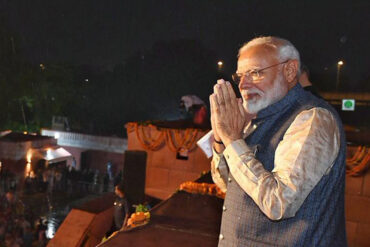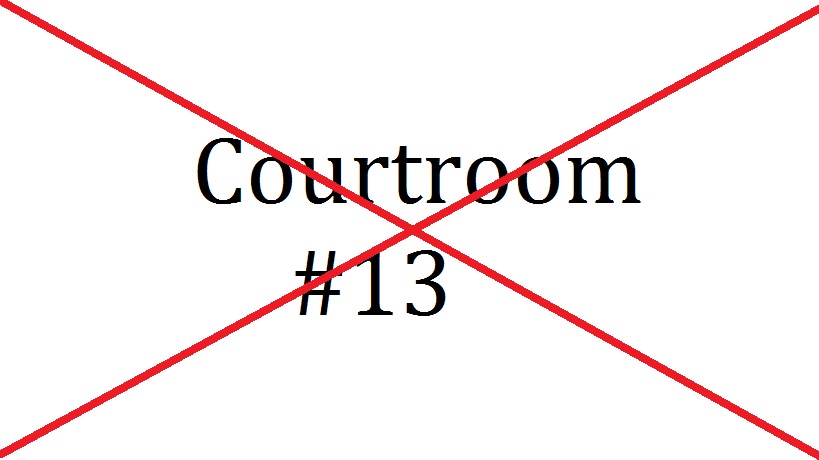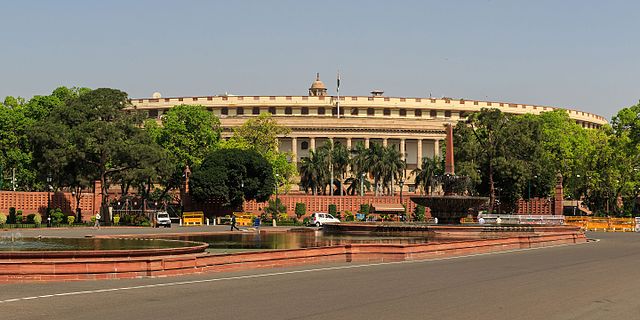When the Government car numbers were allotted recently to the new Ministers, a controversy erupted in Kerala over non-allotment of number 13 car to any Minister. 16 out of the 19 Ministers had refused to be sworn in the name of God and insisted in taking the solemn pledge. No Minister in the previous UDF Ministry owned a number 13 car. The fear of number 13 and avoidance to use it is known as Triskaidekaphobia.
However, after the non-allotment became a controversy, number 13 was demanded by the Finance Minister, Thomas Issac and the Agricultural Minister, V. S. Sunil Kumar. Thomas Issac also sought Manmohan Bungalow, known for misfortunes, as his official residence.
Akin to a common belief in Kerala and it is not only the Government which has succumbed to Triskaidekaphobia but also the Kerala Judiciary. The old High Court building did have a courtroom number 13 but in 1995 it was renamed as courtroom 12A. When the new High Court building started functioning, this practise continued and it did not have a courtroom number 13.
This was challenged in the Kerala High Court through a Public Interest Litigation petition filed by N. K. Chandramohan (WP No. 4268/2006) as a superstitious belief. He sought allotment of number 13 to a courtroom. A bench headed by the then Chief Justice of the Kerala High Court, VK Bali and Justice S Sirijagan not only dismissed the petition but also imposed a cost of INR 10,000 on the petitioner. The Court observed there is no right to be protected or grievance to be redressed in the petition. The Court also noted that the decision to avoid number 13 was “purely administrative in nature” and the Court started functioning in the new building on 13thFebruary of 2006. The Court further remarked that it had “absolutely no hesitation to hold that the petitioner has embarked on a frivolous misadventure to malign/embarrass this court”.
Chandramohan was not ready to lose the battle and went in appeal to the Supreme Court (Civil Appeal 5138/2006). A three-Judge Bench of the Apex Court comprising of Chief Justice Y.K. Sabharwal, Justice C.K. Thakker and Justice R.V. Raveendran came down heavily on the Kerala High Court and made it clear that the High Court is an institution and should not be encouraging any kind of superstitious beliefs.
To avoid an embarrassing situation, the High Court decided to do away with the old numbers and designated courtroom number according to the floor they are situated. The current courtrooms are 1A-1D, 2A-2E, 3A-3D, 4A-4B, 5A-5D, 6A-6D, 7A-7E and 8A. Here the question of giving number 13 does not arise as the High Court has only nine floors.
Speaking to The Kochi Post, Sebastian Paul, an advocate and former member of parliament said, “The present system is more about convenience. It is easy to locate the floors now unlike the old system.” He added, “Some of the judges who used to sit in courtroom number 13 in the old High Court building had passed away while they were serving as Judges. This is why they have tried to avoid number 13. We cannot necessarily say it’s a bad thing. Some may feel this as an inconvenience but not necessarily for all. Our former Minister, M. A. Baby had used the car number 13 and now Thomas Issac is going to use it. I feel rather than skipping 13, the present system of numbering courtrooms is better.”
Media critic and advocate, A. Jayashankar told us, “The Supreme Court had taken to task the Kerala High Court for this superstitious belief they had and also criticised them for imposing costs on the petitioner who challenged the system before the Court. The sole purpose of designating courtrooms floor wise was to bypass the Supreme Court’s order.”
Jayashankar added, “Though there are various superstitious beliefs in Kerala, Triskaidekaphobia did not have its origin from Kerala or even India. The death of certain judge has been attributed to this fear for courtroom number 13 and he was a cardiac patient. He may have died even if he was sitting in Court 12 or 11. There are judges who passed away while they were serving in the other courtrooms.”
In 2013, the Kerala High Court again drew criticism for inviting tender to supply an almanac, ‘Yogakshema Panchangam’ by Kanippayur Narayanan Namputhiripad. The almanac is generally used for determining auspicious timings for special occasions.
The controversy surrounding court room 13 would have flamed out but the fact remains that even the highest judicial institution in the State is not free from the shackles of irrationalities.
In Rabindranath Tagore’s words,
“Where the clear stream of reason has not lost its way into the dreary desert sand of dead habit….Into that heaven of freedom, my Father, let my country awake.”
One can only hope that the constitutional institutions of this country strive to realise the freedom that Tagore had hoped.







